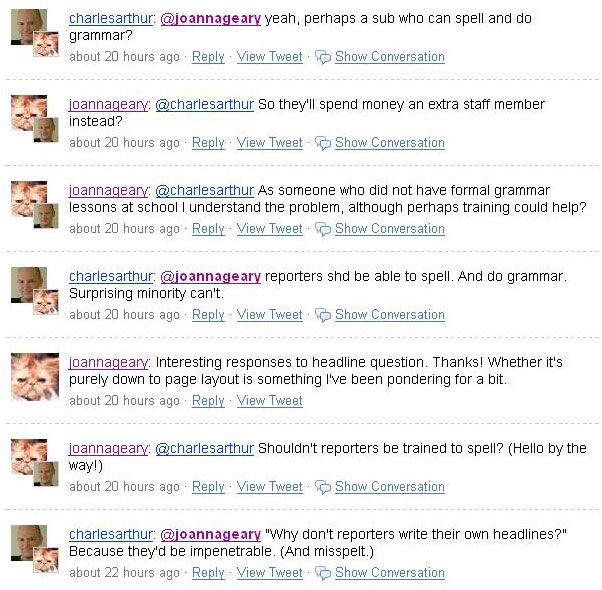So it’s 2009 and the search for a sustainable online newspaper business continues.
Even Google hasn’t quite worked out how traditional newspapers safely navigate past the Rusbridger Cross to emerge as businesses that generates most of their revenue from online operations.
The problem: print commands much higher premiums for advertising then the web does.
In order to compensate for that, web businesses either need to significantly scale up output, or significantly cut back on costs.
Currently one common solution espoused by those immersed in online business is to find someone else to worry about most of the costs for you.
The thinking is thus: the web is already awash with stories produced by other news orgainsations and these can be used as a free resource.
With a bit of repurposing and organising by a small team of copy editors, stories can be presented as an entirely new, high-volume, comprehensive news service.
It’s a smart model – one that could also disrupt the many news aggregation subscription services that exist.
You could also argue that, by combining stories from many sources, better organising them or by integrating social media, these news businesses are occupying a space that could/should have been filled by newspapers a long time ago.
But I still can’t see how their businesses can be sustainable in the long term. By relying on the mainstream media to produce their information in the first place, they are tying themselves into the very business model they claim to be replacing.
If the mainstream media fails, these new businesses fail with it.
Mainstream media provides a volume of news online that is yet to have an equivalent.
I know it’s not a popular argument to make, but I’m afraid no other online content (as it currently stands) will cut it as a replacement. (If you don’t believe me, ask Eric Schmidt.)
Think about it: how many websites would you have to trawl through a day to find as many celebrity gossip stories as you would get from the combined feeds of The Sun, The Daily Star and The Mirror?
More scarily, how many websites would you have to trawl through a day to find an equivalent volume of quality business news that you get from The Financial Times feed?
An alternative theory is that the news industry needs to learn from the music industry and to replicate iTunes or create some other form of paid-for model.
I’m not so sure that works either.
I agree that there is much we can learn from the music industry (that lawsuits and protectionist attitudes won’t save you – for example), but I think there are also very distinct differences.
For example, when consumers download music off the internet for free, they pretty much know they are doing it illegally. The large record companies are not putting out their content for free on their own websites and there is no official Google Music.
We also do not have a market where consumers understand they have to invest in electronic devices for the purpose of accessing print content. This, in my opinion, is why the Amazon Kindle is unlikely to be the answer to the newspaper industry’s woes.
Perhaps a more fruitful investigation would be into developing paid-for products and services that reuse content or closely ally to the media brand.





